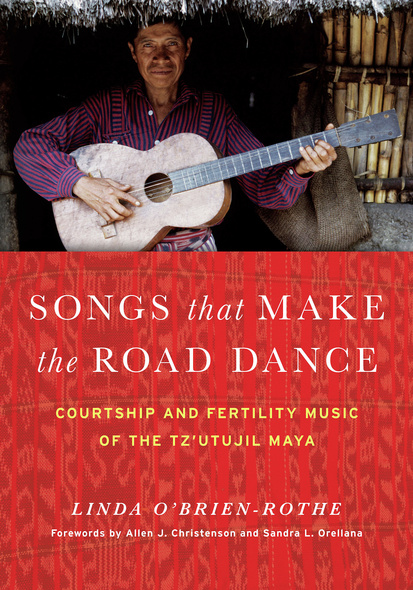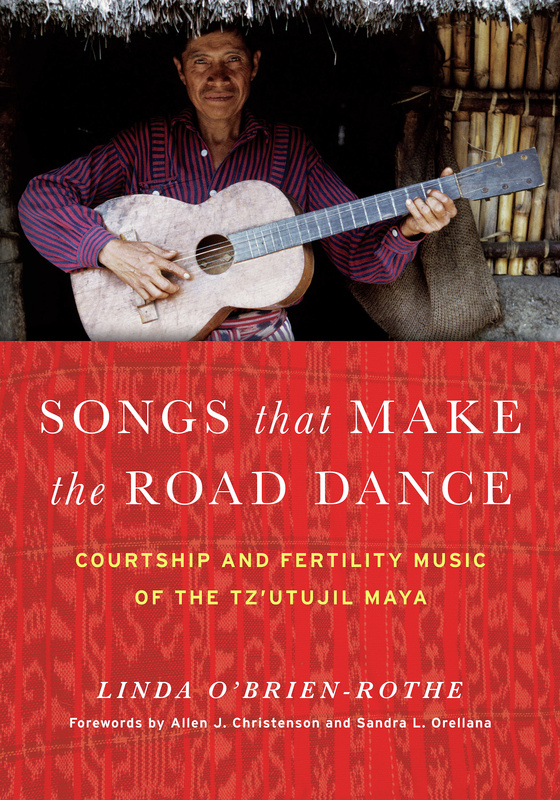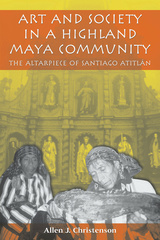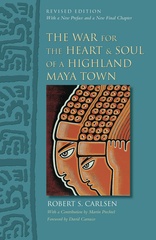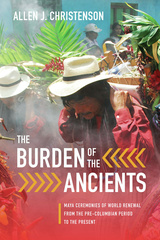Songs that Make the Road Dance
Courtship and Fertility Music of the Tz'utujil Maya
An important and previously unexplored body of esoteric ritual songs of the Tz’utujil Maya of Santiago Atitlán, Guatemala, the “Songs of the Old Ones” are a central vehicle for the transmission of cultural norms of behavior and beliefs within this group of highland Maya. Ethnomusicologist Linda O’Brien-Rothe began collecting these songs in 1966, and she has amassed the largest, and perhaps the only significant, collection that documents this nearly lost element of highland Maya ritual life.
This book presents a representative selection of the more than ninety songs in O’Brien-Rothe’s collection, including musical transcriptions and over two thousand lines presented in Tz’utujil and English translation. (Audio files of the songs can be downloaded from the UT Press website.) Using the words of the “songmen” who perform them, O’Brien-Rothe explores how the songs are intended to move the “Old Ones”—the ancestors or Nawals—to favor the people and cause the earth to labor and bring forth corn. She discusses how the songs give new insights into the complex meaning of dance in Maya cosmology, as well as how they employ poetic devices and designs that place them within the tradition of K’iche’an literature, of which they are an oral form. O’Brien-Rothe identifies continuities between the songs and the K’iche’an origin myth, the Popol Vuh, while also tracing their composition to the late sixteenth and early seventeenth centuries by their similarities with the early chaconas that were played on the Spanish guitarra española, which survives in Santiago Atitlán as a five-string guitar.
[A] new classic in the field of Mayan music studies.
[O'Brien-Rothe's research practices] allowed for a collaborative research approach that was not merely a mechanism to compensate for her language skills but a way to understand the broader uses and meanings of ritual language in songs.
This book is just as important, I believe, as early Colonial indigenous Titles and Testaments for the study of highland Maya theology and worldview. The interpretive material in the book is sound and well grounded in relevant current scholarship, but O’Brien wisely lets the Tz’utujils speak for themselves for the most part.
- Forewords
- Allen J. Christenson
- Sandra L. Orellana
- Acknowledgements
- Introduction
- A Personal Note
- Research in Santiago Atitlán
- Chapter 1. The World of the Tz'utujil Maya
- The World of Spirits
- "Song of the Spirit-Lord of the World" ("B'ix rxin Rajau Mund")
- Duality and Metaphor in the Santo Mundo
- The Presence of the Nawals
- The World of Spirits
- Chapter 2. The Dance and Songs of the Nawals
- Old Mam Creates the Recibos
- "Song of APla's Sojuel" ("B'ix rxin APla's Sojuel")
- Dance, Movement, and Songs: The Divine Currency of Sacrifice
- Dancing the Bundle of San Martín
- Midwife's Prayer and "Song of San Martín" ("B'ix rxin Martín")
- Rocking the Cradle of the Marias
- "Song of the Rocking Cradle"
- Dancing the Wind-Men and the Rain-Men
- Rousing San Martín and the Spirit-Lords of Rain with Song
- "Song of Martín" ("B'ix rxin Martín")
- Calling the Spirits of the Dead and the Drowned with Songs
- Old Mam Creates the Recibos
- Chapter 3. The "Songs of the Road": Texts and Contexts
- The Road in the Tz'utujil Maya World
- Old Mam, the Guardian of the Road, Creates Music and Dance
- The "Songs of Mam" ("B'ix rxin Mam")
- The First and Second "Songs of the Road"
- The "Third Song of the Road": Songs of Courtship and Fertility
- "Songs of the Young Man" ("B'ix rxin C'jol")
- "Songs of the Young Girl" ("B'ix rxin K'poj")
- "AtPal": A Song of Courting
- "Songs of the Young Men and Young Girls, of Insults and Ridicule" ("B'ix rxin C'jola K'poja Xyo'k'a Xtz'u'ja")
- "Songs of the Old Maid"
- Witchcraft and Shapeshifters in the Songs
- "Songs of the Young Girl" ("B'ix rxin K'poj")
- The "Sad Songs" or "Tristes"
- "They Fought" ("Xqueti' qui'")
- "Sad Song of Our Fathers, Our Mothers" ("B'ix rxin Kadta, rxin Kate' Bis")
- "Songs of the Flowers and the Fruit"("B'ix rxin Cotz'ej, Sk'ul")
- "They Fought" ("Xqueti' qui'")
- Chapter 4. The Poetics of Tz'utujil Songs and Their Relationship to K'iche'an Literature
- The Poetics of the Popol Vuh
- The Poetics of Tz'utujil Song Texts
- Parallelism
- Meter
- Onomatopoeia
- Lists
- Assonance and Alliteration
- Composition of the Texts and the Influence of Musical Rhythm
- Chapter 5. The Music of the "Songs of the Nawals"
- Form and Style of the Songs
- The "Recibos of Old Mam": The Vessel of Tz'utujil Culture
- The "Songs of Mam"
- "Sad Song of the Young Man"
- "Song of the Young Girl Who Says Goodbye to Her Mother"
- "Song of the Old Maid" or "Song of the Road"
- "Song of the Fruit"
- The Tz'utujil Guitar
- Historical Origins of the Tz'utujil Guitar
- Tuning
- Playing Style and Technique
- Repertoire
- How the Songs Survived: The Process of Assimilation and Transmission
- Final Words
- Audio Files of Recorded Examples
- Notes
- Glossary
- Works Cited
- Index

